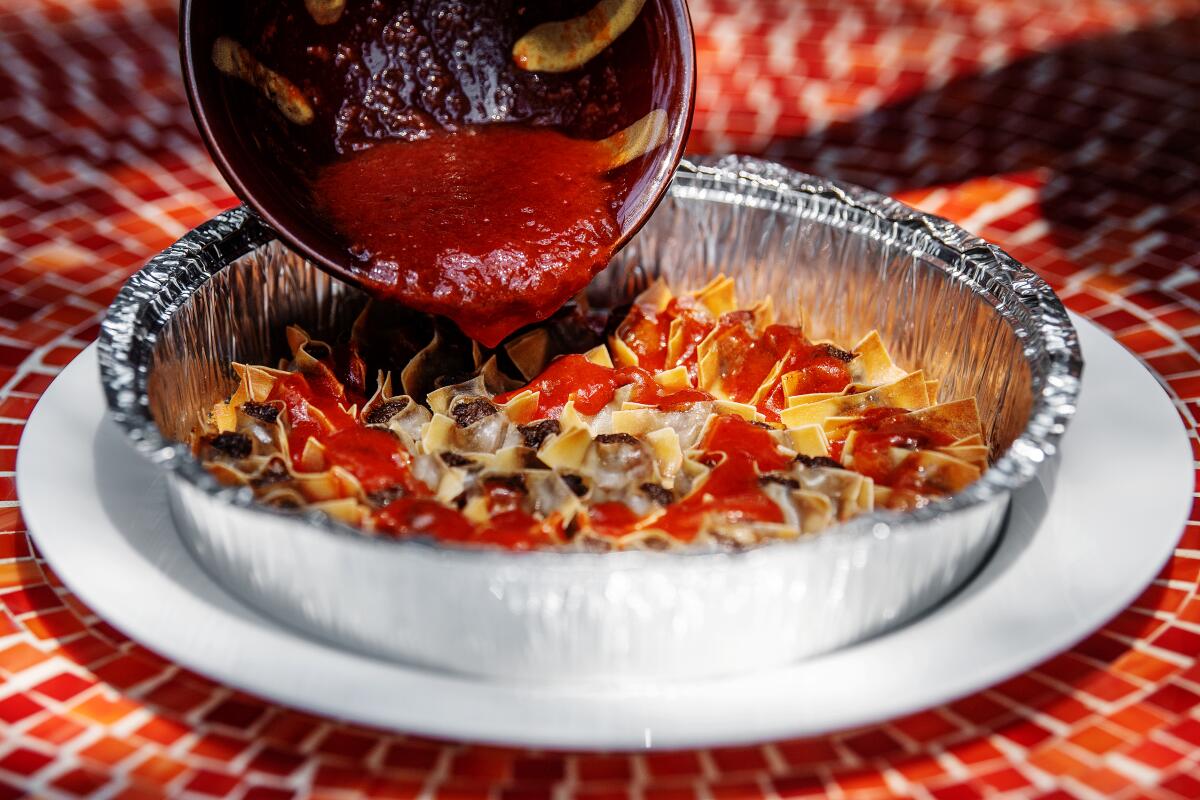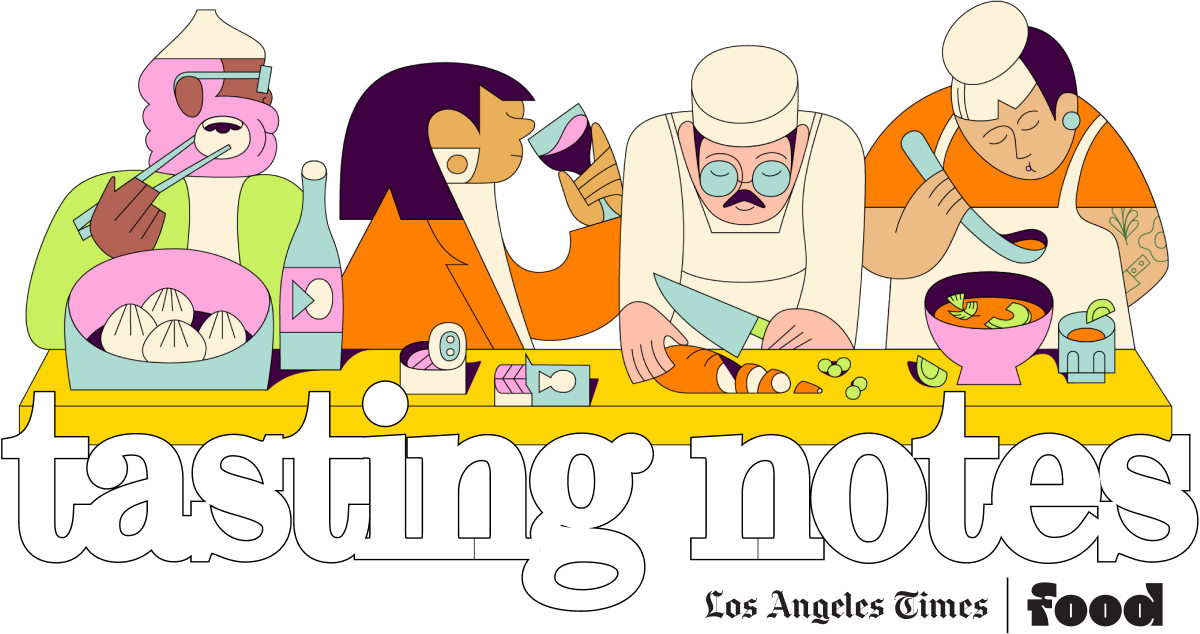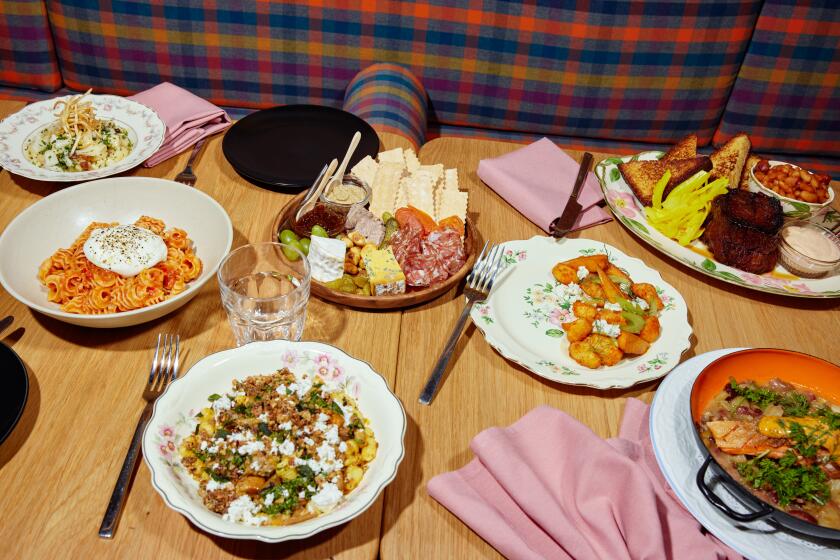Los Angeles, your restaurants need you in their dining rooms

- Share via
“Our hearts and prayers are with our community affected by this fire!” read a post last week on the Instagram account for Zira Uzbek Kitchen, a restaurant in the Fairfax District that opened two months ago. The message, written by owners Azim Rahmatov and Gulnigor Ganieva, went on to volunteer food for firefighters and first responders, which they’d happily deliver themselves anywhere they could reach.
For any of us thumbing anxiously through our social media feeds right now, similar words have become as familiar as sunrise, and so have the actions backing them. Hundreds of chefs and operators continue to mobilize in this crisis to prepare meals for those in need — largely in their own restaurant kitchens, funded by their own resources.
I’d seen Zira’s Insta grid because I was headed there for lunch.

The scene at one restaurant during a devastating week
Fellow food writer Khushbu Shah and I had made plans before the Palisades and Eaton fires began blazing their near-synchronized paths of destruction. Over text we wondered briefly whether to cancel, and then agreed to still meet up.
Among the feelings of rage and hopelessness and our impulse to help those who’ve lost everything in any way we could, we were thinking too about restaurant workers. Business at many places has plummeted, another round of suffering following the pandemic and the entertainment industry strikes in 2023. Without government safety nets, in our society — in Los Angeles — we save restaurants by spending in them.
I scrounged for a packaged N95 mask left over from the worst days of COVID-19, strapped it to my head and walked outside. The sky over Echo Park, where I live, looked ruptured. A smoke-induced, rust-colored haze trailed off into the soft blue of Southern California, a beauty that in the moment seemed untoward. Ash blew off the car’s hood in papery chunks as I drove down the street.
On the same block of Melrose Avenue as Zira, an eyelash salon called LashPlug had its picture windows smashed out. A woman, frowning, stood just inside the shop’s pink-trimmed doors, surveying the glass glittering in shards on the sidewalk.
I reached the restaurant to find there were no other customers.

Khushbu brought our friend Nik Sharma, who was staying with her after he’d evacuated with his pets from his home at Glendale’s northern edge. The lone staffer handling Zira’s dining room told us to sit wherever we wanted. We settled at a table underneath a skylight. Colorful geometric patterns — on pillows and cushions, on embroidered clothing and plates displayed as art — filled the sight line from every angle.
We talked about (what else?) the devastation, the people we personally knew whose houses disappeared in flames, the ways we saw the community responding. Nik was understandably quiet. He stared into the Watch Duty app on his phone, sometimes zooming in, willing the tiny red flags dotting the screen to beam him real-time updates. Khushbu and I did the same.
Dishes started arriving.
A plate of bright salt pickles: shredded red cabbage, cucumbers, tomato. A steamer basket full of plump, crimped manti heavy with spiced pumpkin puree. Smaller pelmeni, dyed pale green from spinach. A bowl of suzma, medium-thick strained yogurt sprinkled with crushed walnuts and drizzled with dill-flavored oil. Lula kebabs molded onto skewers with bladed tips. Lagman (hand-pulled noodles) covered with soy-stained chicken, peppers and scallions. A mild plov, each grain of rice separate and glossy, piled with stewed beef and soft carrot batons.
We blinked at the spread of dishes I’d haphazardly ordered, and then at each other. Devices still in our hands, we switched to Googling the cuisine of Uzbekistan.
Rahmatov and his brother, Azam Rahmatov, grew up in Bukhara, Uzbekistan, a city famous as a major trade center along the ancient Silk Roads. Millennia of commerce and conquest informed its mingled influences of Persian, Turkic, East Asian and, more recently, Soviet culinary canons.
In Azam’s fine cooking, I better grasped a place. But this food, with its many cultural threads, also led my mind around the city, reminding me of restaurants that help define Los Angeles, feeding its greatness like estuaries. The noodles recalled the ropy strands at Dolan’s Uyghur Cuisine in Alhambra. A swipe through the yogurt had me thinking of the mast-o-mousir, spackled with mint oil, at Azizam in Silver Lake. A bite of the pumpkin manti evoked other cross-continental interpretations, from the tiny meat-filled montee of Lebanese-Armenian traditions at Zephyr Mediterranean Grill in Pasadena to the pleated, softball-size mandu at Myung In Dumplings in Koreatown.

There was silent, inescapable anger too, thinking about the suffering, the workers who would be short on pay, how the scale of these wildfires was allowed to happen. A few days after our lunch, Khushbu would publish a newsletter addressing the crisis beneath the crisis. After citing efforts by the people behind Anajak Thai, Fat & Flour and many others, she says plainly, “Independent restaurants are the first to step up and support the most, even though they are the businesses with the least to give.”
The obi non landed last at Zira — a hot, airy round of bread with a golden crust, baked in the shape of a flower with eight curved petals and sprinkled with sesame and nigella seeds. We fell on it, a little wild, even though we had plenty already around us. Ripping into its crisp-soft chewiness was the primal satiation we’d needed right then.
We divvied up the leftovers and I looked around. Only another party of two had wandered in during our meal. I hugged Khushbu and Nik before we trudged back out into the acrid air. We were full, and maybe from the company a little lighter too. I don’t know. I hope so. The winds outside were calmer, fleetingly.
Passing the eyelash salon again, I could see through the shattered window that the woman who’d been surveying the damage now had a customer. Her head was tilted back in a chair as the woman tended to her. The two of them chatted away, carrying on.
You’re reading Tasting Notes
Our L.A. Times restaurant experts share insights and off-the-cuff takes on where they’re eating right now.
You may occasionally receive promotional content from the Los Angeles Times.
Our coverage of the wildfire disasters
- Danielle Dorsey details how the destruction of Altadena is reverberating across L.A.’s Black community. The restaurant Pizza of Venice, she writes, is one in “a new, shattered mosaic”: a topography of Black-owned homes and businesses with a reach that extends far beyond Altadena’s hillside community.
- On the subject of the healing power of bread: Stephanie Breijo has the story of dozens of pizzaiolos, from more than 25 independent restaurants, who came together on Wednesday night at La Sorted‘s in Chinatown to make nearly 250 pizzas for people needing meals.
- Jenn Harris reports on Dean and Pauline Yasharian, owners of French restaurant Perle in Pasadena, who lost their home in the Eaton fire. “It was like an apocalypse, like somebody had dropped a nuclear bomb on our whole community,” Dean said about returning to their neighborhood.
- Cindy Carcamo and Stephanie Breijo talk to out-of-work restaurant professionals whose places of business burned in the fires. “I’ve lost my identity,” said a 55-year-old industry veteran.
- On the topic of cooking, Betty Hallock has suggestions for comforting recipes at home. Nicole Rucker’s drop biscuits sound like ideal balm.
- This week the Food team updated the list of Malibu and Altadena restaurants damaged or destroyed by the fires.
Eat your way across L.A.
Like what you're reading? Sign up to get it in your inbox every week.
You may occasionally receive promotional content from the Los Angeles Times.

Eat your way across L.A.
Get our weekly Tasting Notes newsletter for reviews, news and more.
You may occasionally receive promotional content from the Los Angeles Times.



